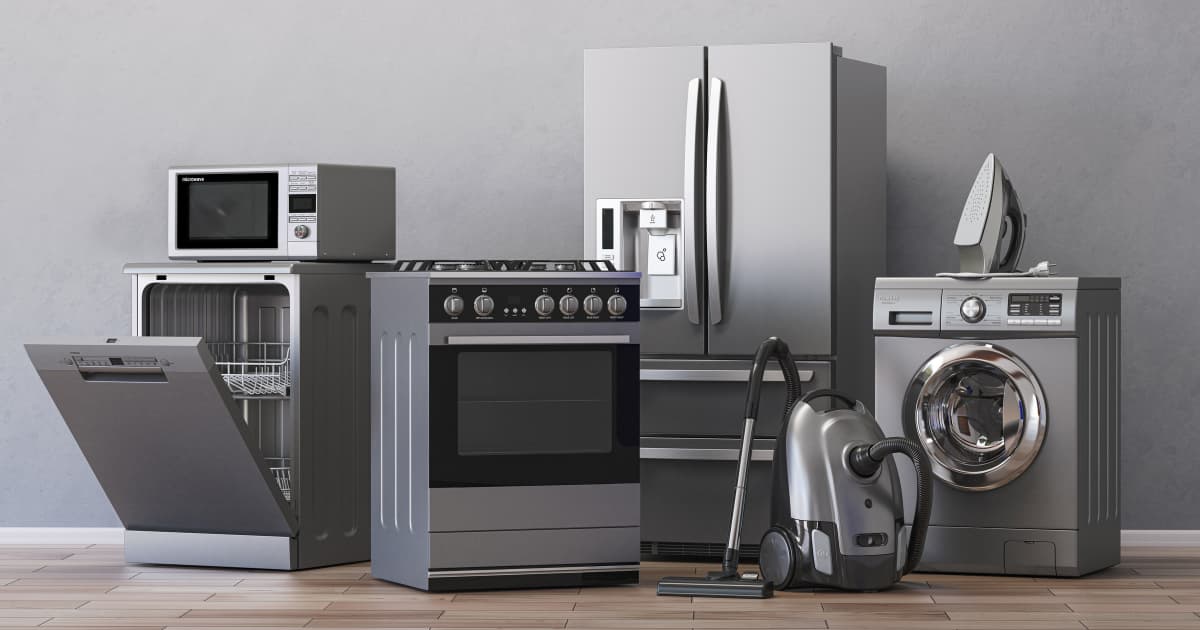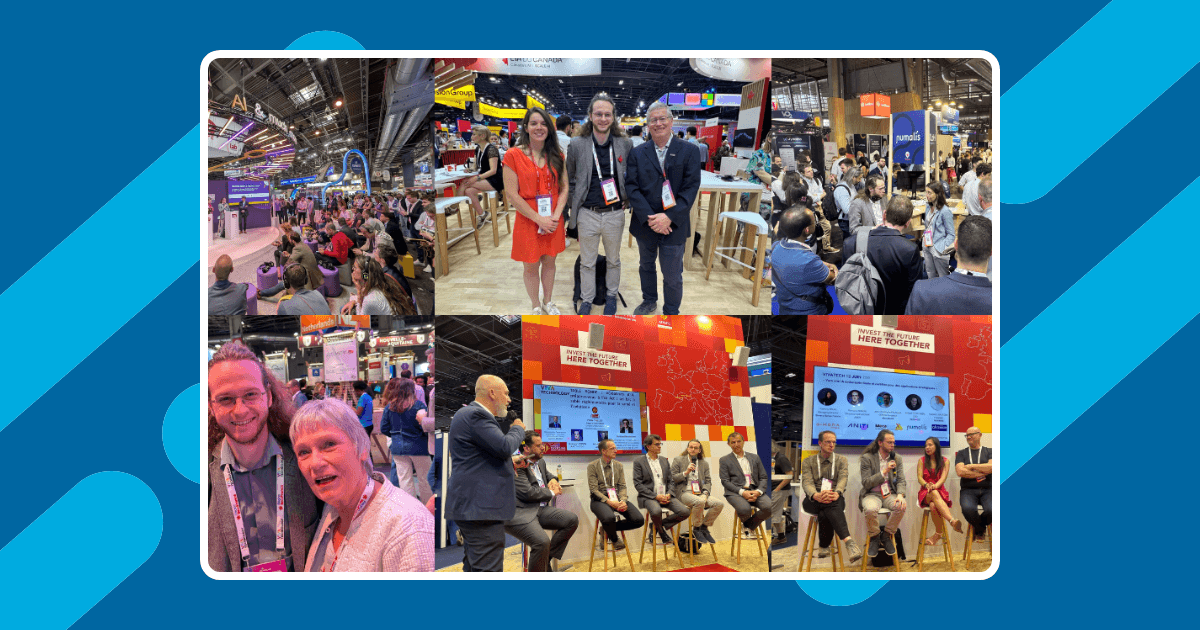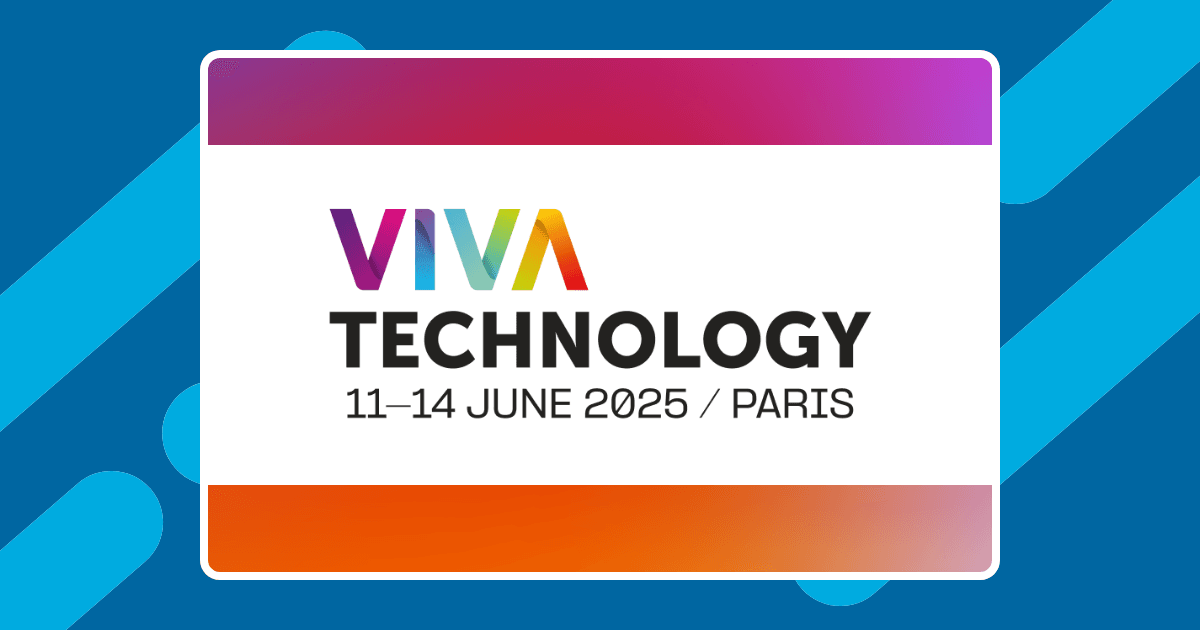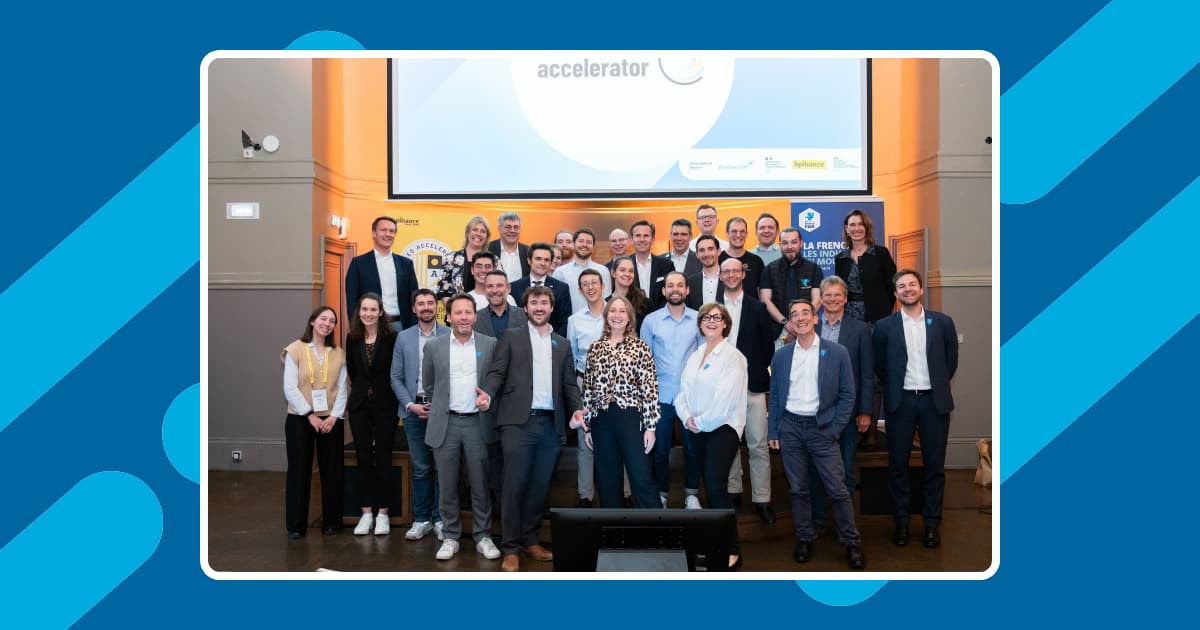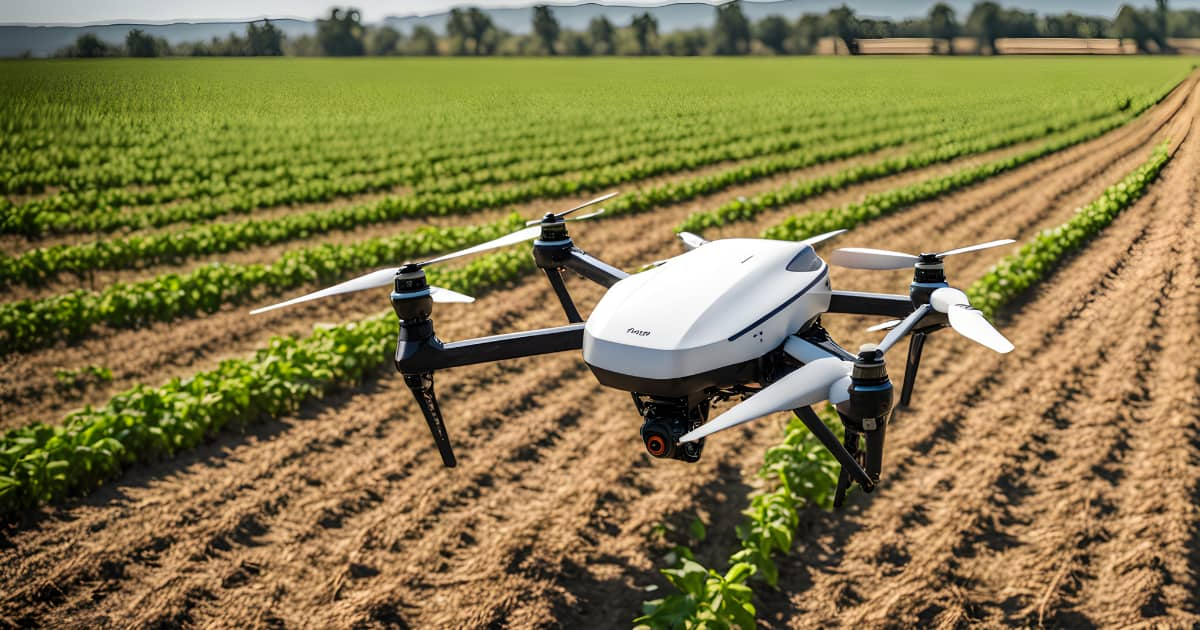Artificial intelligence (AI) is rapidly transforming the home appliance industry. Companies are quickly rolling out appliances powered by AI, offering intelligent options, efficiency, and personalization. The impact is across all segments ranging from major home appliances such as refrigerators to smaller domestic appliances like thermostats, coffee brewers and voice assistants.
With AI-powered home appliances, customers can certainly expect better performances. Refrigerators, washing machines, security cameras, and cooking ovens are expected to drive down operating costs, learn users’ habits and use other contextual data to provide personalized functionalities. These huge leaps result from advancements in processing power, storage, memory, and machine and deep learning techniques.
This article will discuss the current state of AI in home appliances, the future of home appliances, and the challenges facing adoption. We’ll also highlight the companies leading in the race and the capabilities of AI-powered appliances.
AI and its role in home appliances
The application of AI, machine learning(ML), and deep learning techniques make appliances more intelligent and adaptable to complex environments and tasks. Common algorithms utilized in home appliances include Natural Language Processing(NLP), fuzzy-logic based approach, computer vision, image recognition, and manipulation.
Machine learning and smart home appliances
Machine learning allows systems to learn from data collected. Under the hood, intelligent appliances have various sensors to monitor events like light and heat.
With continuous operations, these sensors collect data that can be used to train ML algorithms for specific appliances. This leads to better efficiency in operation in line with daily patterns and routines. For instance, through continuous usage tracking and pattern recognition, an intelligent coffee brewer can start making coffee at 7 am on weekdays and 8 am on weekends.
ML also continues to help in appliance automation and providing personalized user preferences. For instance, a smart vacuum cleaner can automatically start based on your schedule. Assume you typically clean your kitchen after dinner, the vacuum cleaner can start each night after dinner. It can also adjust its cleaning setting to mimic the settings you normally use for your kitchen.
How AI enhances home appliance functionality
Here are some of the different ways AI is enhancing appliance functionality.
Automation: Smart homes are characterized by various interconnected devices, normally controlled by a central hub such as the Samsung Smart Things Hub. AI-powered hubs and platforms help integrate and automate multiple appliances, allowing homeowners to control multiple devices from a centralized platform. They use AI algorithms to learn preferences, analyze data from connected devices and make intelligent decisions. Users can monitor their appliances and issue commands from a single interface or using voice commands.
Smart Voice Assistants: Voice-enabled assistants like Amazon’s Alexa or Google’s Assistant use NLP and ML to answer questions. In their simplest form, you can direct these devices to add something to your shopping list or play a song using your voice. Additionally, depending on interoperability, these assistants can control other aspects of your home, including audio, blinds, and lighting. The ability to control different appliances and devices through voice-activated commands has led to great user experiences, in particular among the elderly and the disabled.
Predictive Maintenance: Appliance failure may stem from a variety of factors such as hardware and software issues. Predictive maintenance enables the forecasting of machine downtime due to component failures, faults, and errors. This ability is highly beneficial for homeowners, as it can enhance the efficiency of large domestic appliances while simultaneously reducing costs. Moreover, predictive maintenance allows for the identification of specific faulty components, meaning that only the defective part needs to be replaced rather than the entire machine. This approach not only saves resources but also makes the process more environmentally friendly. With the widespread adoption of technologies like the Internet of Things (IoT), cloud computing, and artificial intelligence (AI), appliance maintenance has shifted from a reactive to a proactive stance, further streamlining the process.
Analytical models and condition monitoring use data such as vibration analysis and IOT sensors to identify patterns that can represent appliance malfunction or deterioration before they lead to safety hazards1. For instance, LG’s ThinQ technology uses sensors to monitor appliance performance to predict whether they need maintenance2.
Predictive maintenance can also involve using analytics over past data collected from appliances. It’s possible to use pattern recognition to determine the correlation between certain events and machine failure. For instance, it’s possible to determine how many runs a washing machine will have before certain assets show failure signs3.
Other ways AI enhances intelligent home appliances functionalities include:
- Energy efficiency
- Adaptive cooking and baking
- Personalized recommendations
- Remote monitoring and control
Evolution of smart home technology
The concept of a smart home is not new; it was conceptualized in the early 1900s4. Since then, there has been a massive leap in smart appliances’ functionality and performance. For instance, appliances can now automate routine tasks in the house, such as security, lighting control, and energy management. Research studies expect the global smart home appliances market to reach USD 58.5 billion by 2030, growing at a CAGR of 9.2% between 2022-20305.
The emergence of AI-powered Home Appliances: Manufacturers recognized early on that AI would play a significant part in the future of smart homes. Technology has evolved, and now they are AI-based integrated circuits running AI-powered home machines.
Integration of IoT and AI in the Smart Home Ecosystem: IOT refers to a collection of networked devices communicating with each other and even a data storage point like the cloud. The devices allow you to automate your home to a certain degree, such as remote controlling your light and heating. With AI integrated into IOT devices, homeowners can expect more convenience, security, and efficiency with appliances. For instance, an AI-powered smart security camera can now track movement, identify the type of movement and alert the homeowner.
Top companies in the AI home appliance race
There are many companies manufacturing home appliances globally. However, not all have integrated AI into their appliances. Here is a highlight of the top companies currently using AI in their home appliances.
Amazon: The company produces voice-activated home appliances such as the echo dot smart speakers. Other such devices in their lineup include Echo Show and Echo Buds.
Samsung: The company’s home appliances are used globally. The company is known for appliances with incredible energy savings capabilities using the AI energy mode. Some of its AI-powered home appliances include: AI refrigerators, AI Ecobubble washing machines, AI dishwashers, AI-enabled vacuum cleaners, Smart TV.
LG: The company headquartered in South Korea also utilizes AI in major home appliances similar to Samsung. The main appliances that use AI in their lineup are LG’s AI DD washing machine, AI ThinQ refrigerators, and AI dishwashers.
Whirlpool: The company is also involved in producing large smart appliances such as Smart Ovens, refrigerators, and washing machines. They integrate voice assistants for voice control of their appliances.
Siemens: The company produces intelligent home appliances such as fridges, dishwashers, and smart ovens.
Advantages and impact of AI in home appliances
Enhanced convenience
AI-powered home appliances provide many delights through automating routine tasks such as security monitoring and voice-activated assistants. Smart ovens with AI can help improve your cooking. For instance, the Bosch Series 8 oven uses its in-built AI system to predict when a dish is done accurately. It eliminates the need for users to open ovens to check whether their food, such as pastries is done well6.
Time-saving benefits
Most smart gadgets have the component of time-saving. Homeowners can use their smart appliances to automate mundane tasks such as brewing coffee at a specific time and arming and disarming the security system with voice commands.
The appliances that perform excellently in this category are robotic vacuum cleaners such as those from Ecovacs. They can clean the floor automatically, with environment mapping and obstacle climbing features. With object detection capabilities, the robot can avoid objects like slippers and toys and avoid entanglement with cables. These robots use DNN such as Convolution Neural Networks(CNN)7.
Energy efficiency
AI can unlock as much as 15% of energy savings globally by 2040, according to an IEA study. The report suggests that using smart thermostats and smart lighting can contribute up to 10% energy saving between 2017-20408.
Home appliance manufacturers such as Samsung are taking energy saving to the next level through AI-centered features. Their smart refrigerators can reduce power usage by 30% with their AI energy mode feature9. Thermostats and lighting fixtures with intelligence can also reduce power wastage by analyzing usage patterns and adjusting appropriately depending on temperatures and time.
Cost savings through AI home appliances
Predictive analytics, decreased energy, and appropriate water usage are ways households can save on bills using intelligent appliances. Additionally, using devices such as AI-enabled robotic vacuum cleaners and smart security cameras reduces the need to get manual labor, therefore saving costs.
AI energy mode on Samsung washing machines reduces energy consumption by 70%, translating to a reduction in energy costs. They also wash using less water and detergent, resulting in savings for homeowners10.
Personalization and customization of user experience
AI-powered appliances and devices, such as voice assistants, refrigerators, and thermostats, can deliver individualized performances. This is made possible by learning user habits and formulating recommendations.
There’s also a high degree of personalization with AI home security systems. It’s possible to determine authorized users, get custom notifications, behavior analysis, and tailored access control.
Example of home appliances using AI
AI integration into major and small household appliances is powering and changing how we use and interact with home equipment we use daily. There is a wide range of such appliances with such capabilities. Here are the top 5 examples.
AI-powered smart refrigerators
AI-driven refrigerators are context-aware and offer users personalization options. They combine the power of various technologies such as computer vision, NLP, sensors, and wifi connectivity. Essentially, AI in the fridge aims to learn the functional relationship between a user’s input and output, approximate the accuracy of continuous functions, and utilize generalization and flexibility functions11. This makes it possible for the users to draw the following benefits:
- Optimize energy utilization
- Limit food wastage through continuous monitoring of food items and their age
- Meal planning and recipe customization by using an extensive database of recipes
Temperatures on AI refrigerators can adjust automatically depending on the ambient and temperature changes. The power of these units is further multiplied when you have other connected devices, such as voice assistants and smart ovens.
Intelligent washing machines and dryers
AI-powered washing machines bring convenience to homes through understanding the washing cycle selections and schedules. The knowledge of the wash composition can be exploited to determine the correct amount of water, detergent, and completion time. Washers can also detect dirt levels and fabric types to recommend and select the best wash cycle and detergent amount. This leads to optimal resource utilization.
For instance, Samsung’s bespoke AI laundry pair washing machines use AI and advanced moisture detection sensors to determine the dampness of clothes. It subsequently optimizes the washing temperature and adjusts the washing cycle automatically to reduce clothes’ wear and tear12.
ML algorithms such as random forest for classification and logistic regression can help achieve these results13. Although not explicitly stated, AI-enabled washer-dryers are also likely to use neuro-fuzzy and fuzzy ML techniques. They help the appliance to decide the amount of water and detergent required for a specific wash14.
AI-driven cooking appliances
AI-powered smart ovens optimize cooking settings while monitoring food. These appliances can recommend the temperature, cooking mode, and time. These ovens use computer vision for food recognition and burn detection. It’s able to recognize different dishes and ingredients to suggest cooking settings.
A good example is the Bosch’s series 8 oven that connects to an AI cloud server, enabling homeowners to crowdsource settings from similar ovens. Users can select the appropriate cooking program and wait for the oven to predict when the dish is done. These ovens also boast an AI capability that allows them to learn from each other. Data from other users is used in predictive analysis, updating the cooking time every 30 seconds15.
AI voice control in smart homes
Voice Assistant software can be deployed on smart speakers such as Alexa(Amazon), Siri (Apple), and other home appliances. These assistants utilize NLP, DNN, speech recognition, and Natural Language Generation (NLG) capabilities to synthesize user input and output personalized responses. The virtual assistant market is projected to reach a market size of $45.8 billion by 2028 up from $11.3 billion in 202316.
For centralized control, virtual assistants can integrate with other intelligent appliances such as security systems, lights, shutters and coffee makers. Your voice commands will enable you to operate other devices boosting your control.
AI integration in entertainment and multimedia devices
TVs, speakers, and streaming devices are just some of the multimedia devices that can have AI integration. AI-enabled TVs can support voice control, ambient mode, content recommendations, enhanced search capabilities, and upscaling using image processing techniques. This leads to offering a better visual and audio experience.
Combining voice-activated systems such as Google Assistant can make your TV a control hub to control things like lighting, temperatures, or other connected devices17.
The challenges of adopting AI-powered home appliances
A number of challenges still hinder consumers from acquiring AI-capable home appliances. This is despite the fast-paced product releases and innovations in the home appliance markets. We explore these challenges and how they could be overcome.
Appliance cost
The development of household appliances with AI capabilities is generally expensive. It’s especially true for AI systems such as vacuum cleaners, security systems, and refrigerators that demand precision capabilities and optimal daily performances.
Some of the costs encountered in developing AI-enabled smart devices include:
- The cost of research and development due to the use of advanced algorithms, experimentation, and prototyping.
- The cost of collecting data, annotation, cleaning, and training can be expensive and time-consuming.
- The need for specialized expertise trained in AI and versed with home automation can be expensive to hire.
- Need to ensure devices are well secured due to cyber security issues.
- Unlike traditional appliances that are tried and tested, new AI appliances need to undergo rigorous and continuous testing.
- Manufacturers need to consider regulations and certifications based on different markets.
On the consumer end, the high initial purchase cost keeps many away. For instance, AI-enabled Samsung Fridges under the Family Hub category costs upwards of $180018.
Partnering with niche AI companies may help lower costs. Additionally, as the tech becomes more widespread and easily reproducible, the cost of production and consumption of AI-enabled appliances should drop.
Data privacy
AI-enabled appliances collect personal data such as voice recordings, fingerprints, location data, facial scans, and user preferences. Concerns arise to the extent the appliances collect such data. Additionally, companies could use this data to track user locations and habits for targeted marketing and advertising.
Another pertinent issue is third-party data sharing. Companies can share user data for purposes of algorithm improvement and advertising.
For instance, a research study has raised concerns about how AI virtual assistants, such as speakers, gather and share children’s data. The information collected and shared by these appliances does not segregate between children and adult data, impacting children’s privacy19.
User awareness and stricter compliance with data privacy laws could go a long way to alleviate data privacy concerns. Users can opt out of personal data gathering and sharing to avoid privacy issues.
Additionally, appliance providers should detail how they plan to use the data gathered and offer ways for users to opt out of data-gathering schemes. Other ways to improve privacy include data deletion provisions, avoiding collecting children’s data, and being accountable for the data collected.
Cybersecurity
Smart home appliances now face an ever-expanding sphere of threats with the addition of an AI layer. Adversarial actors can now directly target AI algorithms and manipulate them to reach a malicious end goal20.
Attackers can carry out an “input attack” or AI model poisoning with the intent of manipulating the algorithm with a pattern of changes introduced to the training dataset. This can make the appliance malfunction or disrupt service provision because of compromise in the dataset.
AI-powered devices collect a lot of user data and other preferences. Breaches can provide access to this data, which could lead to identity theft and other malicious activities.
Establishing trust is paramount to guarantee the uptake of AI-enabled smart appliances. A malicious act could damage the brand reputation of manufacturers, which could hinder adoption. Additionally, attacks such as distributed denial of service could cause damage in large areas, similar to the Mirai IOT bot that attacked smart devices in the US in 201621.
Manufacturers must use advanced encryption techniques, conduct regular audits across their systems, implement security by design principles, and use secure APIs to bolster security.
Homeowners must also improve their home cyber security using simple strategies like secure passwords and virtual private networks(VPNs)
Lack of standardization
Most companies are using different protocols and technologies because, currently, there are no standards in the manufacturing of smart home appliances. This presents an interoperability issue, as consumers now have to determine which appliances are compatible.
The fragmented development ecosystem leads to user confusion and higher development costs for manufacturers. This can lead to delays in purchases as customers wait for harmonization to avoid issues surrounding longevity and compatibility.
Ethical and regulatory concerns
There are several ethical and regulatory concerns challenging the adoption of intelligent appliances. These include algorithmic prejudice, data privacy, and ethical decision-making. Manufacturers must ensure they are confidential, fair, trustworthy, and accountable, especially with the data collected by their devices22.
Other ethical issues include data privacy, liabilities in case something goes wrong, job displacement, reliability, and safety.
Governments are now developing laws and directives to manage and direct AI usage23. Regulations need to be standardized across nations to help quickly adopt the laws.
Additionally, manufacturers must undertake proper legal strategies to ensure their appliances avoid overstepping users’ rights. Many of these issues will be resolved as technology advances and governments develop prerequisite legislation.
Future of home appliances powered by artificial intelligence
AI promises to have reverberating effects in the smart home industry presently and in the future. As companies develop neural engines and AI chips, there’s a promise of better power and memory management for higher performance. Additionally, as research and development continue unabated, consumers can expect more appliances providing convenience and efficiency.
For instance, smart fridges are expected to be at the forefront of reducing food wastage. Studies show that about 88 million tonnes of food are wasted in the EU annually24. With fridge meal planning, item freshness tracking , and recipe suggestions based on available food items, it’s possible to limit food wastage.
Washers and dryers are likely to improve their efficiency through noise-based anomaly detection. Research into the area is progressing by analyzing functional information from these appliances using DNN25. This will power predictive analytics helping owners and customer service detect appliance malfunction early.
Companies like LG and Samsung are developing on-device AI chips to process vast amounts of data in real-time for better customer experience. With these developments, appliances will communicate together and with devices from other brands. For instance, the LG AI chip can process information in real-time, recognize environmental changes, and adjust appliance performance accordingly26.
The next-generation voice assistant promises to feature a plethora of advancements, including a better understanding of complex commands, interpreting contextual cues, and advancing general intelligence. For instance, Amazon’s Alexa division leaders aim to equip their smart speakers with abilities beyond speech recognition. These assistants will also interpret facial expressions and hand gestures27.
Conclusion
With the integration of AI into appliances, traditional home devices are being supercharged for greater effectiveness. Refrigerators can now meal plan for you and suggest recipes based on items availability, preferences, and dietary goals. With interoperability, a smart oven could be preheated based on your selected meal.
It’s not just fancy functionality that AI-enabled appliances bring. Samsung reports that its AI-enabled refrigerators and washers can reduce energy consumption by 70% with AI energy mode. The appliances study user patterns to determine user preferences and habits to provide continued convenience and personalization. Other positive impacts of AI-enabled devices include increased security, comfort, and personalization.
However, there are challenges that still hinder production and adoption. The primary concern is the cost of development and acquisition. Additionally, in this era where cyber attacks have become common, consumers are still jittery over cyber threats and data privacy issues.
As AI technology continues to develop, we can expect to see even more innovative and sophisticated AI-enabled home appliances in the future.
Sources
- Safety of Smart Domestic Appliances: A review of the opportunities for smart technology to enhance product safety ↩︎
- LG ThinQ™ App: Control Appliances With Your Smartphone | LG USA ↩︎
- Safety of Smart Domestic Appliances: A review of the opportunities for smart technology to enhance product safety ↩︎
- The Evolution of Smart Home Technology ↩︎
- Smart Home Appliances Market Size & Share Report, 2030 ↩︎
- Smart Oven with Artificial Intelligence | Bosch Global ↩︎
- Ecovacs Robotics: the AI robotic vacuum cleaner powered by TensorFlow ↩︎
- Digitalization and Energy – Analysis – IEA ↩︎
- Samsung Takes Energy Saving to the Next Level, Adding 10% Savings on Top of the Highest Efficiency Standard ↩︎
- What is an energy-efficient washing machine? | Samsung New Zealand ↩︎
- Review article Artificial intelligence models for refrigeration, air conditioning and heat pump systems ↩︎
- Samsung Expands Bespoke Lineup with New AI-Powered Washers and Dryers ↩︎
- Loads Estimation using Deep Learning Techniques in Consumer Washing Machines ↩︎
- Intelligent Washing Machine Using Soft Computing ↩︎
- Smart Oven with Artificial Intelligence | Bosch Global ↩︎
- Intelligent Virtual Assistant Market – IVA – Size, Share & Growth ↩︎
- LG TVs with AI ThinQ®: Listen. Think. Answer. TV Evolution | LG USA ↩︎
- Shop our Best 4 Door Flex Refrigerators | Samsung US ↩︎
- Home Life Data and Children’s Privacy ↩︎
- Attacking Artificial Intelligence: AI’s Security Vulnerability and What Policymakers Can Do About It | Belfer Center for Science and International Affairs ↩︎
- The Mirai botnet explained: How teen scammers and CCTV cameras almost brought down the internet | CSO Online ↩︎
- The ethics of artificial intelligence: Issues and initiatives ↩︎
- AI in 2023: Key trends and developments ↩︎
- Smart strategies for household food waste management ↩︎
- Noise-based self-supervised anomaly detection in washing machines using a deep neural network with operational information – ScienceDirect ↩︎
- [On the Job] LG SIC Center: Making Smart Home Appliances Smarter | LG NEWSROOM ↩︎
- Amazon’s new head of Alexa shares his vision for the future, including new shopping and entertainment features ↩︎

